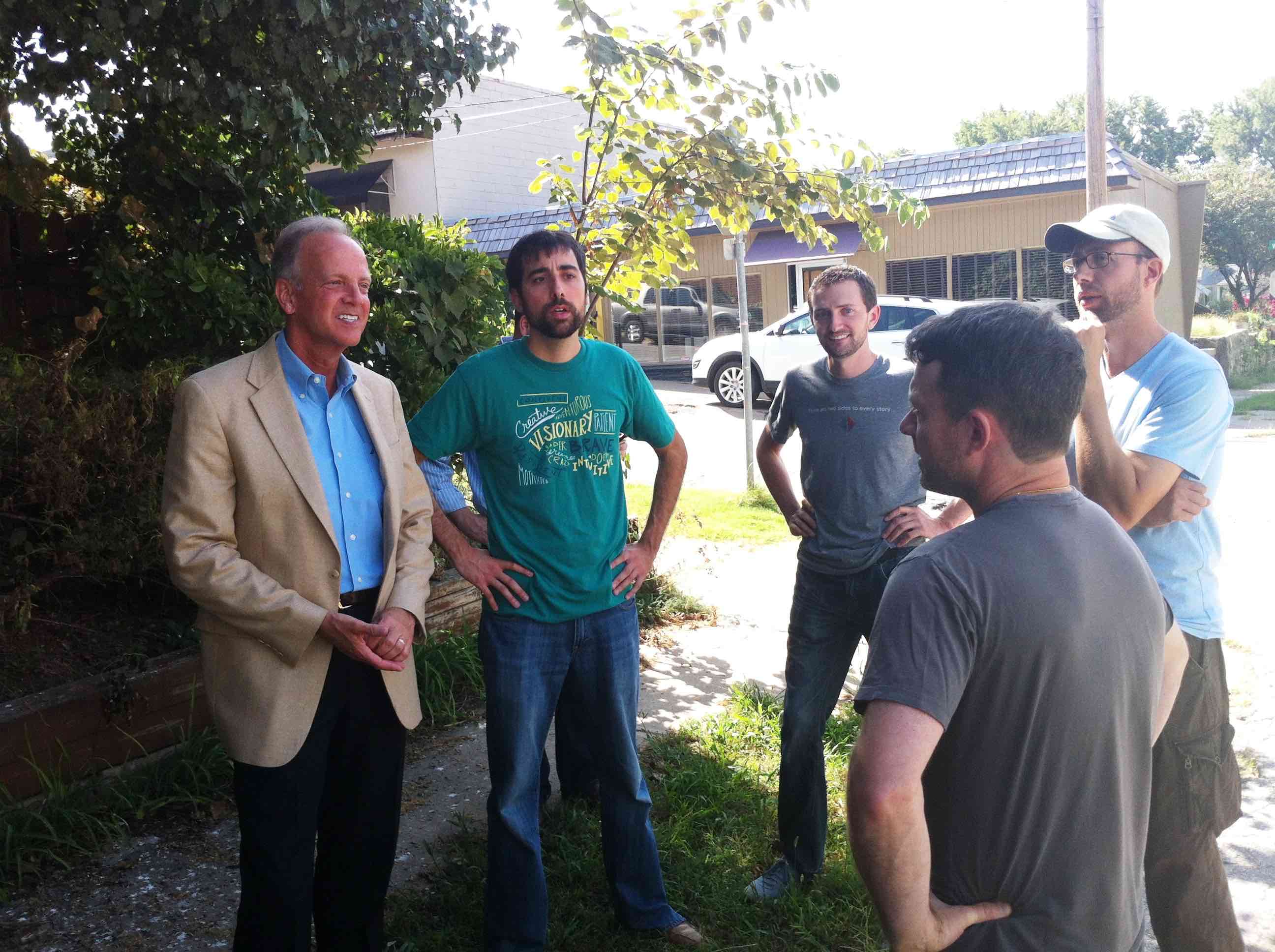Federal legislation geared toward boosting entrepreneurship would make it easier for foreign-born innovators to obtain permanent resident status in the United States.
“The newly-introduced Startup Act promotes public policies that would change our KC startup community for the better,” said Melissa Roberts, vice president of communications and outreach for Enterprise Center of Johnson County, which endorsed the legislation.
Immigration provisions included in the bill, which was introduced Thursday by U.S. Sen. Jerry Moran, R-Kansas, would open up new markets of STEM-savvy talent for local tech and startup companies, Roberts said. It also would create pathways to permanent resident status for immigrants who have been educated at Kansas and Missouri colleges and universities to create local jobs and drive economic growth by starting companies in the U.S., she added.
Immigration-related provisions in the Startup Act, S.1877:
- Establishes a limited entrepreneurial visa for 75,000 legal immigrants, so they can remain in the United States, launch businesses and create jobs;
- Creates a new limited STEM visa so 50,000 U.S.-educated foreign students, who graduate with a master’s or Ph.D. in science, technology, engineering or mathematics, can receive a green card and stay in this country where their talent and ideas can fuel growth and create American jobs;
- Eliminates the per-country caps for employment-based immigrant visas, which hinder U.S. employers from recruiting the top-tier talent they need to grow.
Current immigration law doesn’t include provisions specific to entrepreneurs, said Jeff Bell, shareholder and immigration attorney with Kansas City-based Polsinelli. But the new pathways provided by Moran’s bill appear to dovetail with proposals advocating for a more merit-based approach to immigration policy, he said.
“It would create jobs for U.S. workers, which ultimately is one of the main goals of our immigration system: Try to attract talented, hard-working foreign nationals to the United States and allow them to create businesses and grow the economy,” Bell said.
That doesn’t mean the legislation is guaranteed to pass Congress, he said, noting Moran originally introduced the Startup Act in 2011, and has attempted to garner support for its several iterations since with limited success.
“From the political side of things, there are competing interests,” Bell said.
Some on the far-right are not in favor of any additional immigration to the United States, regardless of the skilled nature of the workers involved, he said. Others on the left likely would object to the bill because it only attacks one specific portion of immigration, rather than providing a comprehensive look at immigration. Another significant segment of decision makers don’t want to make any changes until existing border security is addressed, he added.
“We’re a long way from this becoming law,” Bell said.
Opponents of the legislation already are referring to it as “the outsourcing bill,” though Kansas City continues to suffer from a labor shortage, particularly within the tech industry. As a May report from the KC Tech Council notes, 4,699 tech jobs in the metro went unfilled at the end of 2016.
Falling behind, losing talent
While Kansas City and other Midwest metro areas promote their own active entrepreneurial ecosystems, Moran said data from the Ewing Marion Kauffman Foundation points to a decline in the number of startups overall.

U.S. Sen. Jerry Moran
“New business formation and the rate of entrepreneurship have reached historic lows,” Moran said in a release. “Simply put, America is falling behind and losing talent and jobs to countries overseas. Congress must work to reverse these trends and support policies that allow better opportunities for someone to take an idea, bring it to market, and in the process of pursuing that success, create jobs for other Americans.”
The rate of new entrepreneurs in the U.S. decreased in 2016 to 0.31 percent (from 0.33 percent), or 310 out of every 100,000 adults starting new businesses each month, Moran’s office said in a release, referencing data from the 2017 Kauffman Foundation Startup Activity Index.
Kauffman research also shows that immigrants to the United States are nearly twice as likely as native-born Americans to start businesses, and first-generation immigrants now make up nearly 30 percent of all new U.S. entrepreneurs, Moran’s office said.
“Too many have been left out of our economy. There’s a connection between the long-term decline in entrepreneurship and the effect on productivity, growth and wages,” said Jason Wiens, director of policy at the Kauffman Foundation. “Fewer startups means a lower quality of life for all Americans. We need more startups, fast.”
“Based on research, we know that skilled immigrants are more likely than native-born to start new business that hire Americans,” Wiens added. “Job creation, innovation and overall quality of life for all Americans would receive a boost by increasing the numbers of entrepreneurs in our nation, whether American or foreign-born.”
Worldwide innovation leader
The legislation’s overall aim is to increase U.S. competitiveness, said U.S. Sen. Roy Blunt, R-Missouri, who backed the bipartisan bill alongside Moran, and Mark Warner, D-Virginia, and Amy Klobuchar, D-Minnesota.
“The Startup Act will make it easier for entrepreneurs to start and grow their businesses, resulting in more good-paying American jobs,” Blunt said. “(It also will ensure) that we have the workforce we need in high-demand STEM fields, which will pave the way for new innovations and stronger economic growth.”
One example: The legislation stipulates using existing federal research and development funding to support university initiatives designed to bring cutting-edge research to the marketplace more quickly where it can propel economic growth.
“Allowing federal R&D funding to be used to test and fund commercialization activities will open up a massive resource to startup companies, and may help close the seed capital gap,” said ECJC’s Roberts. “It’s now incumbent upon other players, especially state and local government to step up efforts to provide the technical assistance that non-academics need to secure those R&D grants.”
Other noteworthy provisions of the legislation:
- Requires all government agencies to conduct a cost-benefit analysis of all proposed “significant rules” with an economic impact of $100 million or more. This new requirement will help determine the efficacy of regulations and their potential impact on the formation and growth of new businesses;
- Directs the U.S. Department of Commerce to assess state and local policies that aid in the development of new businesses. Through the publication of reports on new business formation and the entrepreneurial environment, lawmakers will be better equipped to encourage entrepreneurship with the most successful policies;
- Accelerates commercialization of taxpayer-funded research to bolster regional commercialization strategies in converting research into new products and services; and
- Expands and refines the EDA’s Regional Innovation (RI) program, including restoration to its originally authorized $100 million level under the Stevenson-Wydler Technology Innovation Act of 1980. The proposed funding increase would support more innovation systems throughout the country and make awards to pilot a wider variety of outcome-based approaches toward addressing regional innovation needs.
In addition to being supported by the ECJC, provisions in the Startup Act have been endorsed by the Kansas City Chamber of Commerce, Information Technology Industry Council, National Venture Capital Association, CCIA, Center for American Entrepreneurship, Sprint, SSTI, Engine, CTA, Kansas State University’s Institute for Commercialization, and Internet Association, according to Moran’s office.




































